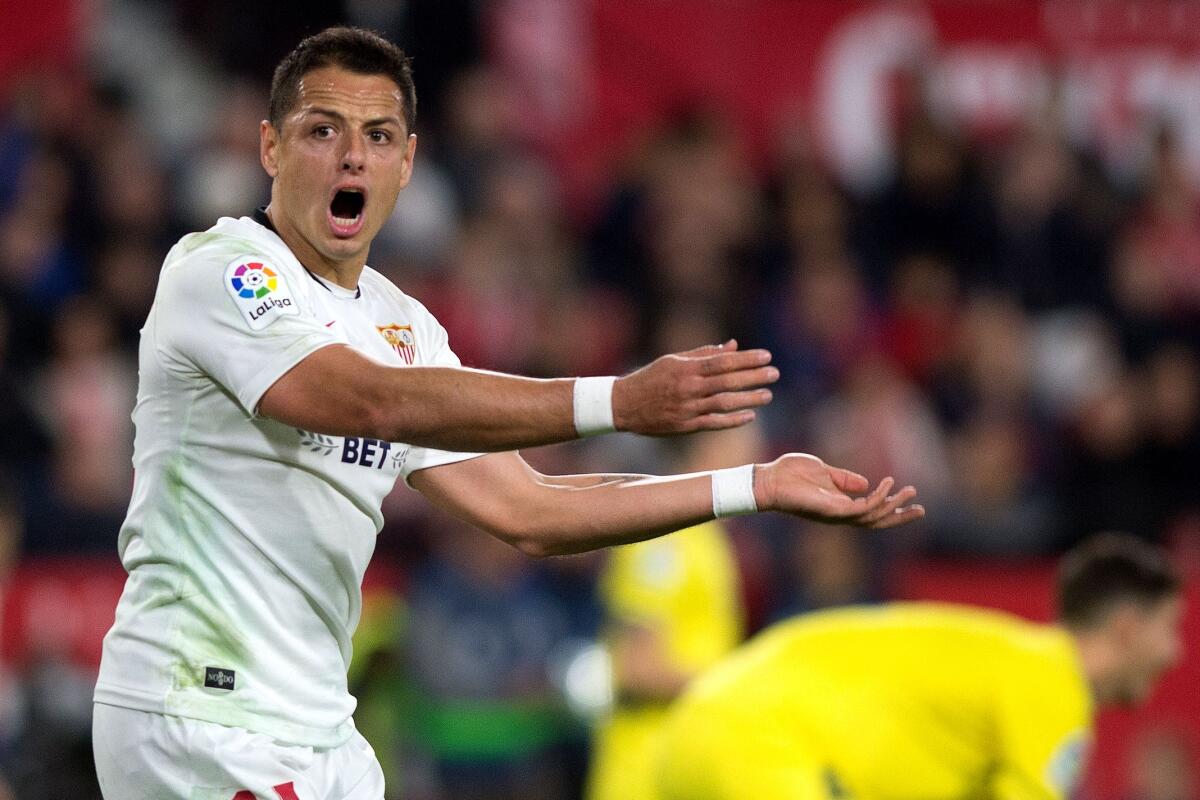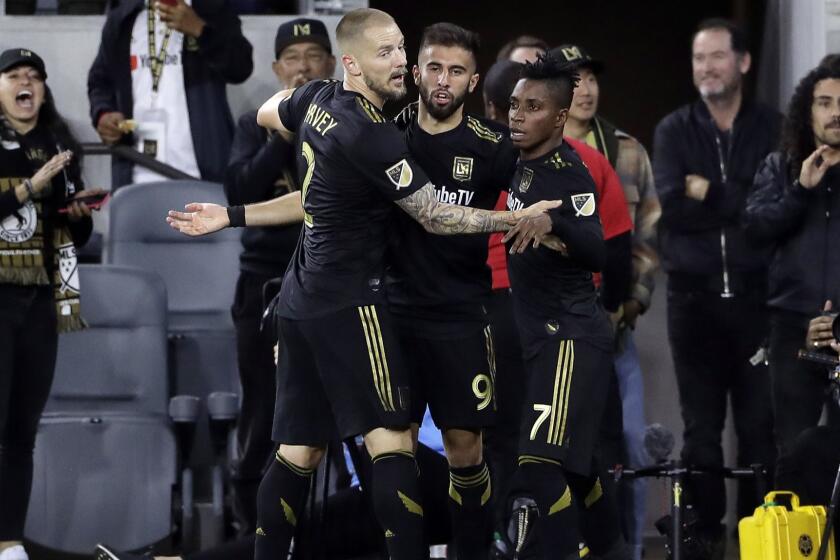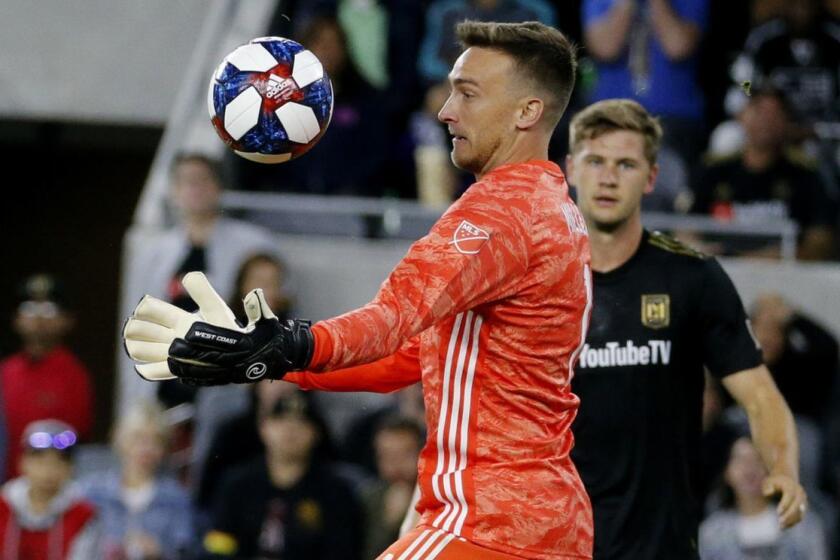Column: In Galaxy of stars, Javier “Chicharito” Hernández is another triumph for MLS

- Share via
David Beckham couldn’t transform the Galaxy into the Lakers or Dodgers. Javier Chicharito Hernández won’t, either.
This reality shouldn’t diminish the Galaxy’s impending deal for Hernández, which will rank as one of the most significant player transfers in Major League Soccer history when completed.
By now, the league has to know there are no saviors. Success for the Mexican striker won’t be defined the way it was for Beckham, who failed to deliver on hopes that he could do for MLS what, say, Wayne Gretzky did for the NHL.
MLS is a different league than it was back then.
Down to 10 teams after the Tampa Bay Mutiny and Miami Fusion were contracted in 2002, the league now has 26 franchises, with four more to come over the next two years. Most teams play in their own soccer-specific stadiums. The league has stabilized enough to where it has the luxury of appreciating the value of gradual progress.
Reaching this point has required MLS to do more than attract new fans to the sport. The league also has had to convince skeptical soccer fans who watch foreign competitions that its product was worthy of their time.
LAFC’s roster this upcoming season includes many South American players.
While no player has radically changed the picture overnight on either front, the league’s high-profile players have helped.
Beckham’s celebrity improved the league’s image. Zlatan Ibrahimovic’s consistent stream of spectacular goals and hilarious one-liners ensured soccer fans who didn’t follow MLS would be periodically reminded of the Galaxy’s existence.
Carlos Vela’s world-class talent has provided LAFC with the centerpiece of a team that is playing at a level no domestic franchise has reached before.
And now comes Javier “Chicharito” Hernández, who — like Magic and Tiger — is known by his nickname alone.
Los Angeles has become home to some of Mexico’s most famous players in recent years, including Vela and brothers Gio and Jonathan dos Santos, who were signed by the Galaxy. None are anywhere near as revered as Hernández, who has been the face of Mexican soccer over the last decade.
The last Mexican player of this stature to play in MLS was Cuauhtemoc Blanco, who moved to the Chicago Fire in 2007 as a 34-year-old. Hernández is 31.
Whereas Vela and the Dos Santos brothers started their careers in Europe — Vela with Arsenal of England and the Dos Santos brothers with Barcelona of Spain — Hernández broke into the professional ranks with Chivas of Guadalajara, one of Mexico’s two most popular teams.
Hernández was a third-generation soccer player. His maternal grandfather, Tomas Balcazar, also played for Chivas and represented Mexico at the 1954 World Cup. His father, who was also named Javier Hernández, was on Mexico’s 1986 World Cup team.
Hernández scored twice in the 2010 World Cup, after which he moved to Manchester United of England.
A loss to Seattle in the 2019 Western Conference final leaves LAFC with some unfinished business to attend to when preseason training camp opens Monday.
While Vela refused to play for the Mexican national team over a four-year period that included the 2014 World Cup, Hernández became a mainstay on El Tri. And while Gio Dos Santos developed a reputation as an underachiever, Hernández became Mexico’s all-time leading scorer.
Hernández became something of a nomad in recent years, his most recent move taking him to Sevilla of Spain, where he found himself planted on the bench and in search of an escape. His diminished role in Sevilla came at an opportune time for the Galaxy, which had to replace the departed Ibrahimovic.
So long as he remains healthy, Hernández figures to be a productive player for the Galaxy, unlike the since-departed Gio dos Santos. While Hernández is three seasons removed from his last 10-plus goal season and his speed has been diminished by age, his clever off-the-ball movement should make him a consistent scorer in the defensively deficient MLS.
Hernández will be well positioned to capitalize on that production. He is known as a more willing and engaging spokesman than the cooperative but naturally reticent Vela, which should give the Galaxy more opportunities to connect with a local Mexican population that still counts Mexico’s Liga MX as its soccer league of choice. He is also comfortably bilingual, which should make him appealing across multiple demographics.
The Galaxy won’t overtake Chivas or Club America as Mexico’s favorite team. The five-time MLS champions won’t leapfrog as the Lakers or Dodgers as Los Angeles’ signature team.
But they don’t have to. Like Beckham and Ibrahimovic before him, Hernández will make MLS more relevant than it was before. That’s enough. MLS doesn’t require saving. It just has to continue moving forward. And if the league can advance five strides instead of one because of Hernández, that should be considered a triumph.









